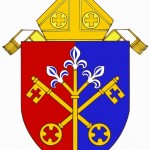At this week’s General Assembly of the U.S. Conference of Catholic Bishops, Auxiliary Bishop Christopher Coyne of Indiana was elected by his brother bishops to the Chairmanship of the USCCB’s Committee on Communications.
Bishop Coyne is well known to Catholics on social media–as a blogger and writer, on television and radio, on Facebook and on Twitter. In years past, his helpful tweets live from the floor of the USCCB have kept me apprised of what’s happening in the Catholic world.
On his blog Let Us Walk Together: Thoughts of a Catholic Bishop, Bishop Coyne reported on the discussions this week in Baltimore. In particular, he expressed concern about analysis by some members of the media, who looked at the meeting as a kind of “litmus test” for how the bishops of the United States regard Pope Francis.
Drawing on his many conversations with bishops, USCCB staff, guests and observers, Bishop Coyne offered some thoughts to clarify why the meeting progressed as it did.
First, he explained, the work of the Conference is set in advance according to a four-year “priority plan.” The current plan was determined in 2012, and predates Pope Francis’ pontificate. The four priorities as established then and in use now are:
- Strengthening marriage and family life;
- Faith formation and Sacramental practice;
- Affirming the life and dignity of the human person;
- Supporting religious liberty.
- To act collaboratively and consistently on vital issues confronting the Church and society;
- To foster Communion with the Church internationally under the leadership of the Pope;
- To offer appropriate assistance to each bishop in his local church.
Were concerns about the current Pope and his agenda a concern for the American bishops, in planning this year’s meeting? Bishop Coyne writes:
The amount of work, time, and effort that goes into establishing the “priorities” is huge. Every bishop has an opinion, every bishop has a vote, and every Ordinary has to weigh these “priorities” in light of the particular pastoral situation he is dealing with in his Archdiocese or Diocese. It takes a lot of wrangling and consensus building for the bishops of the United States to come to a place where they can agree to four “priorities” out of all the issues and challenges we face.Now, could we choose to “reboot” the priorities in light of the election, teaching, and direction of Pope Francis? Of course. But to do so quickly and smoothly would not be easy. Since the process of establishing the “priorities” is one that takes over a year and a half of meetings and review to come to a successful conclusion, it would take at least a year to do so again in midstream. And that could only happen if we could get a majority of the bishops to agree to do so.Furthermore, the work of each department and staff of the Conference is set and directed by the priority plan. When I meet as a member of various USCCB Committees and sub-Committees, the Conference staff reports to us about their work in reference to the “priorities.” A lot of time, talent, and resources are in play. That has to be taken into account as well. Now, again, this doesn’t mean a “reboot” can’t be done. It would just take a major action by the bishops and a willingness to accept a major cost in terms of resources to do so. Frankly, I don’t see it happening as the process itself allows for a reset of the priorities every four years anyway (see below).So our priorities and our general mission is set. In light of this, what went on at the last meeting was not a refutation of anything Pope Francis has asked the bishops to consider, nor an act of confusion among the bishops as to where the Pope is asking us to “move” as a Church. It was, basically, a continuation of the work of the Conference that was set into motion almost three years ago. The priorities that were established back in 2012-13 are still “driving the bus” and will, most probably do so, until the Fall of 2016.In addition, the priorities that we set back then are still for the Conference priorities now. Are we easy targets of the charge that we are fighting the political “culture wars” when the Conference defends traditional marriage, beginning of life and end of life issues, and religious liberty? Yup. Is it easy for those who seem to know what “Francis really means or is saying” to say that the bishops are running counter to what the Pope’s wishes may be? Yes indeed especially if one can claim to know what the Pope “knows.” But this begs the question: Is the Conference presently undertaking as a priority anything counter to the content of what Pope Francis is saying regarding matters of faith and morals? Absolutely not. And nothing changes the fact that the present “priorities” of the Conference are still of vital importance to the life and mission of the Church in the United States at the present time.The bishops of the USCCB have begun the process of setting the priorities for the next four-year cycle which begins in 2016. At this week’s general session, we bishops broke into regional meetings for the first discussion of what those priorities might be. In my group, Region VII (IN, IL, WI), the discussion was wide-ranging and very “Francis-centered” – evangelization, care for the poor, immigration reform, our mission to youth and young adults, greater outreach and care for our Latino brothers and sisters, care for the marginalized, for the hurting and lost, as well as our on-going work on behalf of families and human life. There was a lot of references to “Evangelii gaudium,” to Pope Francis’ speeches and homilies, and to the new direction the Holy Father was taking us. It was a very healthy, honest, and open discussion.Is there a lot of work and discernment ahead within the Conference? Absolutely. The Conference is by its very nature a large institution that is often hard to steer in one direction let alone change course midstream. But the large and sometimes unwieldy group of pastors who make up the USCCB membership will find our way to continue to “foster Communion with the Church under the leadership of the Pope” under the wisdom and guidance of the Holy Spirit.
The answer, then, is a resounding “No”–You did not see, as some bloggers and columnists have implied, a backlash against the pope. You can read Bishop Coyne’s remarks in their entirety here.











